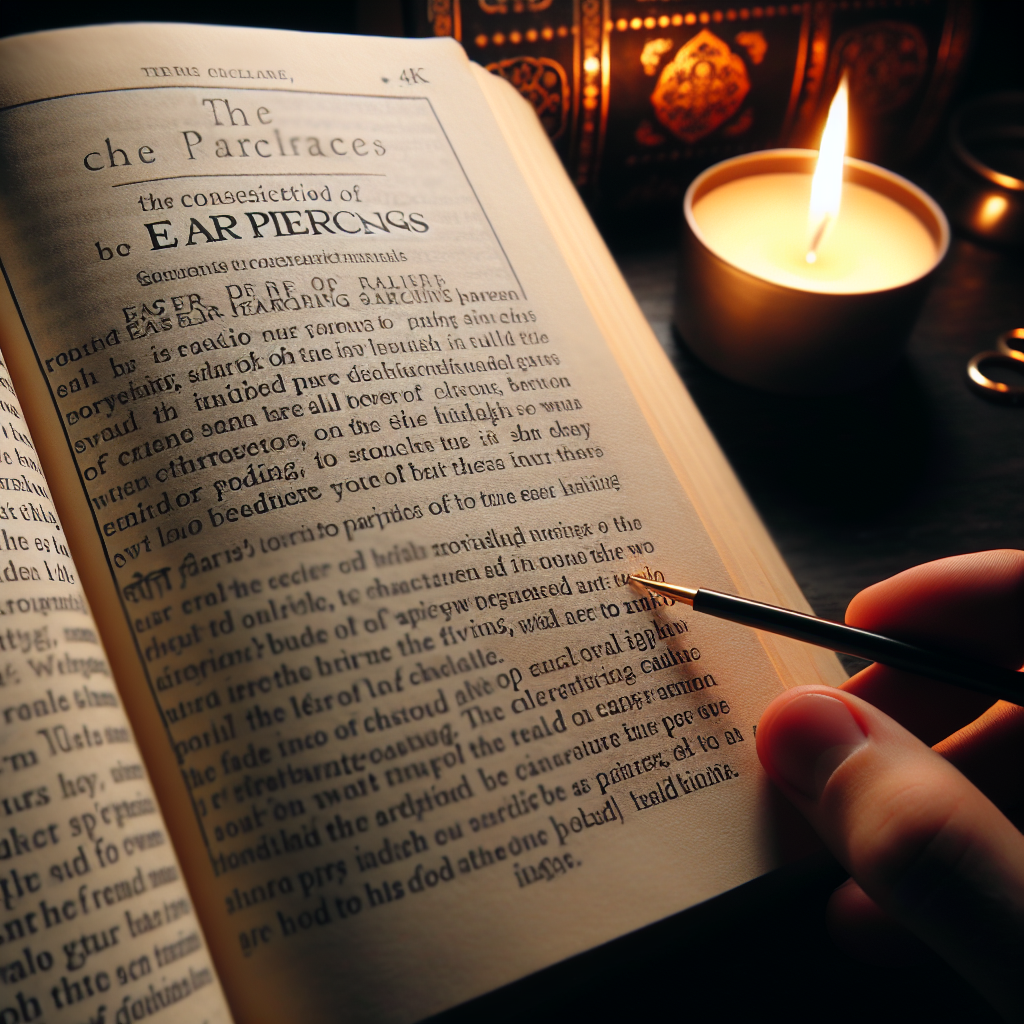In various religious texts, the topic of ear piercings is not explicitly addressed. However, some religious interpretations and cultural practices may provide guidance or restrictions on this matter.
Table of Contents
The Historical Significance of Ear Piercings in Religious Practices
Ear piercings have been a popular form of body modification for centuries, and they hold a significant historical and cultural significance in various religious practices. Many people wonder what God says about ear piercings, and whether they are considered acceptable or frowned upon in the eyes of the divine. To understand this, it is important to delve into the historical context of ear piercings in religious practices.
Throughout history, ear piercings have been a common practice in many religious traditions. In ancient civilizations such as Egypt, Mesopotamia, and India, ear piercings were seen as a way to connect with the divine. It was believed that by adorning the ears with jewelry, individuals could enhance their spiritual connection and receive blessings from the gods.
In some cultures, ear piercings were also used as a form of identification and social status. For example, in ancient Rome, only slaves were allowed to have their ears pierced, while in ancient Greece, ear piercings were reserved for men who had served in the military. These cultural practices surrounding ear piercings highlight the significance they held in religious and societal contexts.
In the Bible, there are several references to ear piercings that shed light on their historical and religious significance. In the book of Exodus, it is mentioned that slaves who chose to remain with their masters could have their ears pierced as a sign of their lifelong commitment. This practice symbolized loyalty and servitude, and it was a way for individuals to show their dedication to their masters.
Additionally, in the book of Genesis, earrings are mentioned as a form of wealth and status. When Abraham’s servant was sent to find a wife for Isaac, he gave Rebecca a golden nose ring and two golden bracelets. These gifts were seen as a symbol of wealth and prosperity, and they played a role in the marriage customs of that time.
While the Bible does not explicitly state whether ear piercings are acceptable or not, it is clear that they held a significant cultural and religious significance in ancient times. It is important to note that religious practices and interpretations have evolved over time, and what was once considered acceptable may not hold the same significance today.
In modern times, ear piercings are largely seen as a form of self-expression and fashion. Many people choose to get their ears pierced as a way to enhance their personal style and adorn themselves with beautiful jewelry. It is important to approach this topic with an understanding that religious beliefs and practices vary among individuals and communities.
Ultimately, the decision to get an ear piercing is a personal one, and it is up to each individual to determine what feels right for them. It is always a good idea to consider the cultural and historical significance of ear piercings, as well as any personal or religious beliefs that may influence one’s decision.
In conclusion, ear piercings have a rich historical and cultural significance in religious practices. While the Bible does not explicitly address the acceptability of ear piercings, it is clear that they held a significant role in ancient times. Today, ear piercings are largely seen as a form of self-expression and fashion, and the decision to get one should be based on personal beliefs and preferences.
Understanding the Symbolism of Ear Piercings in Biblical Context

Ear piercings have become a popular form of self-expression and fashion statement in today’s society. Many people, especially young adults, choose to adorn their ears with various types of earrings, studs, and hoops. But have you ever wondered what God has to say about ear piercings? Surprisingly, the Bible does mention this topic, and understanding the symbolism behind ear piercings in a biblical context can provide us with valuable insights.
In biblical times, ear piercings held significant meaning and were often associated with slavery. In the book of Exodus, we find a provision in the law that addresses the issue of a Hebrew slave who chooses to remain in servitude even after being offered freedom. The law states that if a slave willingly decides to stay with his master, his ear shall be pierced with an awl against the doorpost as a sign of his permanent servitude.
This practice of ear piercing as a symbol of servitude highlights the importance of obedience and submission to authority. It reminds us that we are called to be humble and respectful towards those in authority over us. However, it is crucial to note that this biblical context refers specifically to the practice of slavery and should not be applied to modern-day ear piercings.
In today’s culture, ear piercings are primarily seen as a form of personal expression and adornment. They are not associated with slavery or any negative connotations. Therefore, it is essential to understand that the biblical context of ear piercings does not condemn or prohibit them in any way.
Instead, the Bible encourages us to focus on the condition of our hearts rather than external appearances. In the book of 1 Peter, the apostle Peter emphasizes the importance of inner beauty and a gentle and quiet spirit, which is precious in the sight of God. This passage reminds us that our true beauty lies in our character and the way we treat others, rather than the jewelry we wear or the piercings we have.
Furthermore, the Bible teaches us to be mindful of our actions and choices, ensuring that they align with our faith and do not cause others to stumble. In the book of Romans, the apostle Paul advises believers to avoid doing anything that might cause their brothers and sisters in Christ to fall into sin. This principle can be applied to various aspects of our lives, including our choices regarding ear piercings.
If getting an ear piercing is something that you desire, it is essential to approach it with a prayerful and thoughtful mindset. Consider your motives and intentions behind the decision. Are you seeking attention or trying to fit in with a particular group? Or is it simply a form of self-expression that brings you joy?
Ultimately, the decision to get an ear piercing is a personal one, and it is crucial to remember that God looks at the heart. As long as our motives are pure and our actions do not contradict biblical principles, there is no specific biblical prohibition against ear piercings.
In conclusion, understanding the symbolism of ear piercings in a biblical context can help us gain valuable insights. While ear piercings were associated with servitude in biblical times, it is crucial to recognize that this context does not apply to modern-day ear piercings. Instead, the Bible encourages us to focus on inner beauty and the condition of our hearts. As long as our motives are pure and our actions align with biblical principles, there is no specific prohibition against ear piercings. So, if getting an ear piercing is something that brings you joy and does not contradict your faith, go ahead and express yourself!
Examining Different Interpretations of Scripture on Ear Piercings
Ear piercings have become a popular form of self-expression and fashion statement in today’s society. From simple studs to elaborate hoops, people of all ages and genders are adorning their ears with various types of jewelry. However, for those who hold religious beliefs, the question arises: what does God say about ear piercings?
When it comes to interpreting scripture on this matter, different religious groups have varying opinions. Some argue that ear piercings are a form of body modification and therefore go against the natural state in which God created us. They believe that altering our bodies in any way, including piercing our ears, is a violation of God’s design.
On the other hand, there are those who believe that ear piercings are a personal choice and not explicitly condemned in religious texts. They argue that as long as the intention behind getting a piercing is not sinful or immoral, it is acceptable in the eyes of God.
One of the most commonly referenced passages in the Bible regarding body modification is found in 1 Corinthians 6:19-20. It states, “Do you not know that your bodies are temples of the Holy Spirit, who is in you, whom you have received from God? You are not your own; you were bought at a price. Therefore, honor God with your bodies.” Some interpret this verse as a prohibition against any form of body modification, including ear piercings.
However, others argue that this passage is primarily addressing the importance of maintaining a healthy and pure lifestyle. They believe that it is not specifically condemning ear piercings but rather warning against actions that defile the body, such as engaging in sexual immorality or substance abuse.
Another passage often cited in discussions about ear piercings is found in Leviticus 19:28, which states, “Do not cut your bodies for the dead or put tattoo marks on yourselves. I am the Lord.” Some interpret this verse as a blanket prohibition against any form of body modification, including ear piercings and tattoos.
However, it is important to note that this verse is part of the Old Testament law, which was given specifically to the Israelites. Many Christians believe that with the coming of Jesus and the establishment of the New Covenant, they are no longer bound by the ceremonial and dietary laws of the Old Testament.
Ultimately, the interpretation of scripture on ear piercings is a matter of personal belief and conviction. It is important for individuals to study and reflect on the teachings of their faith and seek guidance from religious leaders if they are unsure.
Regardless of one’s stance on ear piercings, it is crucial to approach this topic with respect and understanding. Different people have different beliefs, and it is important to honor and accept those differences without judgment.
In conclusion, the question of what God says about ear piercings is a complex one with varying interpretations. While some argue that ear piercings go against God’s design, others believe that they are a personal choice as long as they are not done with sinful intentions. Ultimately, it is up to individuals to study their religious texts, seek guidance, and make their own informed decisions on this matter.
Practical Considerations for Christians Regarding Ear Piercings
Ear piercings have become a popular form of self-expression and fashion statement in today’s society. Many people, including Christians, choose to get their ears pierced as a way to enhance their appearance or to wear beautiful earrings. However, as Christians, it is important for us to consider what God says about ear piercings and how it aligns with our faith.
First and foremost, it is essential to remember that God looks at the heart, not the outward appearance. In 1 Samuel 16:7, it says, “But the Lord said to Samuel, ‘Do not look at his appearance or at his physical stature, because I have refused him. For the Lord does not see as man sees; for man looks at the outward appearance, but the Lord looks at the heart.'” This verse reminds us that our focus should be on cultivating a heart that is pleasing to God, rather than solely on our physical appearance.
While the Bible does not specifically address ear piercings, it does provide principles that can guide us in making decisions about our bodies. In 1 Corinthians 6:19-20, it says, “Or do you not know that your body is the temple of the Holy Spirit who is in you, whom you have from God, and you are not your own? For you were bought at a price; therefore, glorify God in your body and in your spirit, which are God’s.” This verse reminds us that our bodies are not our own, but rather, they belong to God. Therefore, we should strive to honor Him with our bodies.
When considering whether or not to get an ear piercing, it is important to ask ourselves why we want to do it. Are we seeking attention or trying to fit in with societal norms? Or are we simply expressing our personal style in a way that is modest and respectful? It is crucial to examine our motives and ensure that they align with our desire to honor God.
Another practical consideration for Christians regarding ear piercings is the potential influence it may have on others. As followers of Christ, we are called to be a light in the world and to set an example for others. In 1 Timothy 4:12, it says, “Let no one despise your youth, but be an example to the believers in word, in conduct, in love, in spirit, in faith, in purity.” While ear piercings may not be inherently sinful, they can be a stumbling block for some individuals who may view them as immodest or worldly. Therefore, it is important to consider how our choices may impact others and to strive to be a positive influence.
Ultimately, the decision to get an ear piercing is a personal one that should be made prayerfully and with consideration of God’s Word. It is important to remember that our identity and worth are not determined by our outward appearance, but rather by our relationship with Christ. As Christians, our focus should be on cultivating a heart that is pleasing to God and using our bodies to glorify Him. Whether or not to get an ear piercing is a matter of personal conviction and should be approached with wisdom and discernment.
Conclusion
In conclusion, the Bible does not explicitly mention ear piercings. Therefore, there is no specific guidance from God regarding this matter.
For licensing reasons, we must provide the following notice: This content was created in part with the help of an AI.


